Research Group
Members of the Social and Applied Ecology Research Group
Post-doctoral researchers and Fellows
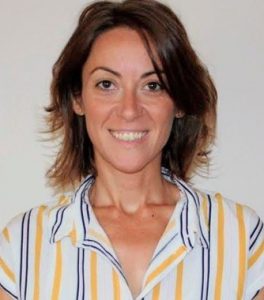
Yolanda Melero is a researcher in the field of empirical ecology, grounded in theory, with a particular focus upon spatial metapopulation dynamics for applied biological conservation and management. Her research has included the study of animal populations inhabiting both natural and artificial environments (e.g. urban environments). Currently she is working on the interaction of environmental conditions and species traits as drivers of global species extinctions and community homogenisation using butterfly species as study system within her project EXTINCT (MSCA-IF-2017, ID 795890). During her free time she usually enjoys any outdoors activity, yet her current favourite is windsurfing.
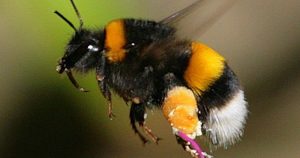 Emma Gardner is an interdisciplinary researcher who brings physical science expertise to ecological systems. She specialises in building time-dependent spatial models to study the drivers of variability in complex interacting systems. Her current work involves modelling the resilience of UK pollinator populations and quantifying the biodiversity and human benefits derived from landscapes to inform land-use decisions and policy. Her collaborative work with the NGO ARG UK received international press coverage and she is actively involved in public engagement. In her previous life as an astrophysicist, she conducted cutting edge research into black holes.
Emma Gardner is an interdisciplinary researcher who brings physical science expertise to ecological systems. She specialises in building time-dependent spatial models to study the drivers of variability in complex interacting systems. Her current work involves modelling the resilience of UK pollinator populations and quantifying the biodiversity and human benefits derived from landscapes to inform land-use decisions and policy. Her collaborative work with the NGO ARG UK received international press coverage and she is actively involved in public engagement. In her previous life as an astrophysicist, she conducted cutting edge research into black holes.
 Luke Evans’ PhD was focussed on modelling butterfly movement and behaviour to predict responses to changing climates and landscapes. He is now researching the factors underpinning community stability in butterflies and birds. Luke enjoys playing and coaching Rugby and watching cooking programs, unfortunately, this has made little improvement to his culinary skills.
Luke Evans’ PhD was focussed on modelling butterfly movement and behaviour to predict responses to changing climates and landscapes. He is now researching the factors underpinning community stability in butterflies and birds. Luke enjoys playing and coaching Rugby and watching cooking programs, unfortunately, this has made little improvement to his culinary skills.
PhD Researchers
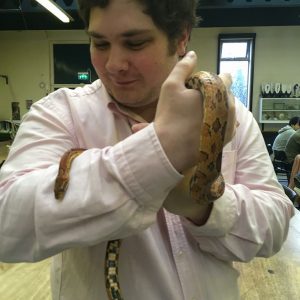
Alex Dean is both conducting research, and teaching on the undergraduate degree programs. His research focusses on the relationship between mycorrhizal fungi and plant roots, with a particular interest in intraspecific variation. Mycorrhizal symbioses are common across most plant species, and are crucial in aiding with water and nutrient acquisition, as well as myriad other benefits. His PhD examines the role mycorrhizae may play in saving black poplar, the UK’s most endangered native tree. Outside of work he is a keen singer, and a lover of history and literature. He is currently very into dystopian novels, which is fairly ominous.

André Dornelles is working as a joint-PhD student between the School of Biological Sciences and Henley Business School, funded under a CAPES Brazilian scholarship. His work investigates different mechanisms that ‘lock-in’ global food systems into unsustainable, unhealthy and/or inefficient trajectories through a holistic and interdisciplinary lens. More specifically, he is using a data-driven approach to identify ‘transformation archetypes’ in the global food systems by exploring historical trends of input, output, productivity, and economic metrics and their social and environmental outcomes (involving 161 countries from 1995 to 2015). André enjoys cooking, boxing, and travelling with his wife and family.
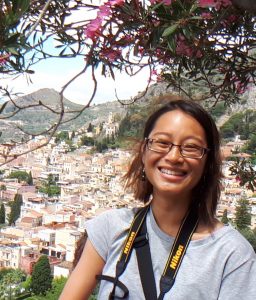
Chanida Fung is a PhD researcher & Graduate Teaching Assistant at the University of Reading, studying how different functional traits within a insect species (intraspecific variation) can affect its: (1) survival; (2) interaction with other organisms and (3) response to environmental change. In her spare time you’ll either find her doing science communication, travelling, snapping photos or doing arts & crafts! Main Supervisor: Dr. Manuela Gonzalez research web pages here
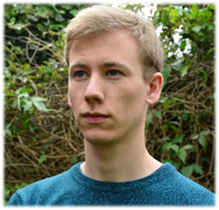
Matt Greenwell is researching landscape genetics of butterflies and is currently co-ordinating the UK Butterfly Genetics Monitoring Scheme. He splits his time between working with butterfly DNA in the lab and butterfly data on his PC. Matt is a keen science communicator and hosts Just Another Science Show with fellow PhD student Chanida Fung. He’s happiest when outside with a pair of binoculars, preferably up a mountain.
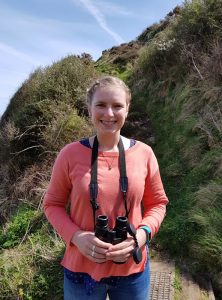
Lisbeth Hordley is studying spatiotemporal population dynamics and the consequences for ecosystem functioning in the UK. She is using long-term monitoring datasets for British birds alongside functional trait data to investigate our ability to measure the resilience of ecosystem functions. In her spare time, Lisbeth is either out on her road bike or on long walks with her rescue dog, Leo.
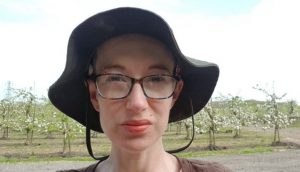
Louise Hutchinson’s research is centred on the role of bee species diversity in the sustainable pollination of four UK crops; apple, field bean, oilseed rape and strawberry. She works with field survey datasets from across Europe and occupancy model data from the Centre of Ecology and Hydrology. She is an active member of the Bees, Wasps and Recording Society (BWARS) and is an avid biological recorder. Louise is also a keen runner, and can regularly be found getting very muddy on trails throughout Berkshire.
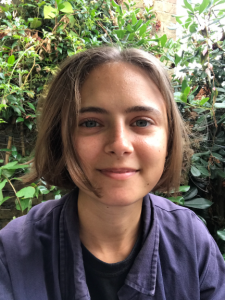
Eleanor Jackson is investigating the role of pre-dispersal insect seed predators in maintaining tropical plant diversity in Panama. She is using long-term datasets of seed rain to model community dynamics and collecting information on individual plant species and their enemies in the field. She enjoys bouldering and indoor gardening, her favourite book is The Day of the Triffids.

Laura Merritt is applying mathematical approaches to the dispersal of plants and animals.
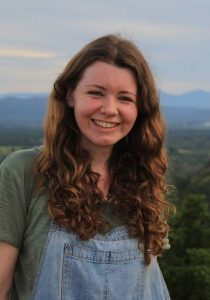
Kathryn Powell’s research focusses on understanding the drivers of change in insect populations in the UK, and the consequences insect declines may have for vital ecosystem processes. She is using long-term data sets from large scale projects and citizen science programs to understand how different insect populations respond to environmental change over space and time, comparing and contrasting between terrestrial and freshwater ecosystems, and to model the resilience of ecosystem functions through using species trait databases. In her spare time Katie loves to cook feasts for her friends, plays the cajon drum and enjoys trudging through muddy countryside.
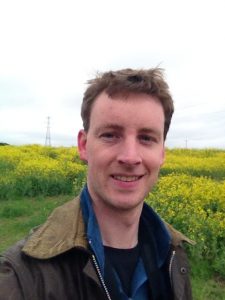
John Redhead – John’s research focusses on the spatial ecology of organisms which deliver ecosystem services, in particular pollinators and pest-controlling invertebrates. He works with large-scale spatial datasets to analyse patterns across space, time and levels of ecological organisation (from individual organisms to populations and communities). John enjoys birding, running and reading dystopian fiction – although not usually simultaneously.
Past PhD students
Dr. Suzanna Mason – Geographic range shifts in UK fauna
Dr. Claire Dooley – Density dependence in butterflies
Dr Simon Mills – Responses of European butterflies and birds to extreme events
Dr. Luke Evans – Individual-based models of butterfly movement
